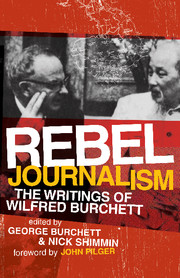Book contents
- Frontmatter
- Contents
- List of Photographs
- Acknowledgements
- Foreword by John Pilger
- Foreword by Gavan McCormack
- Introduction
- 1 The Atomic Plague [1945]
- 2 With Mick Griffith to the Plaine des Lacs [1941]
- 3 Who is Wingate Anyway? [1944]
- 4 The Trial of Cardinal Mindszenty [1951]
- 5 Liberty in Eastern Europe [1951]
- 6 The Microbe War [1953]
- 7 Koje Unscreened [1953]
- 8 The Ball-Point Pen Murders [1954]
- 9 South of the 17th Parallel [1955]
- 10 Front-Line Village [1959]
- 11 Welcome Home [1961]
- 12 Gagarin: The First Interview with Western Journalists [1961]
- 13 Virgin Lands [1962]
- 14 Lilac and Outer Space [1962]
- 15 War Against Trees [1963]
- 16 The Tragedy of South Vietnam's Ethnic Minorities [1964]
- 17 Interview with General Vo Nguyen Giap (April 13, 1964)
- 18 A Fortified Hamlet [1965]
- 19 Patriots & Mercenaries [1965]
- 20 At Ground Level [1966]
- 21 A Spurned Olive Branch [1967/1977]
- 22 Personal Leader [1968]
- 23 The Tet of Peace [1973/1977]
- 24 ‘Something from Nothing’ Township [1976]
- 25 Evaluating the Past [1976]
- 26 Mercenaries: British Export Model [1977]
- 27 The Geneva Conference [1978]
- 28 How to be a Good Khmer Rouge [1981]
- 29 China Prepares to Attack Vietnam [1981]
- 30 Afterword [1983]
- Notes
- Bibliography
- Index
30 - Afterword [1983]
Published online by Cambridge University Press: 22 September 2009
- Frontmatter
- Contents
- List of Photographs
- Acknowledgements
- Foreword by John Pilger
- Foreword by Gavan McCormack
- Introduction
- 1 The Atomic Plague [1945]
- 2 With Mick Griffith to the Plaine des Lacs [1941]
- 3 Who is Wingate Anyway? [1944]
- 4 The Trial of Cardinal Mindszenty [1951]
- 5 Liberty in Eastern Europe [1951]
- 6 The Microbe War [1953]
- 7 Koje Unscreened [1953]
- 8 The Ball-Point Pen Murders [1954]
- 9 South of the 17th Parallel [1955]
- 10 Front-Line Village [1959]
- 11 Welcome Home [1961]
- 12 Gagarin: The First Interview with Western Journalists [1961]
- 13 Virgin Lands [1962]
- 14 Lilac and Outer Space [1962]
- 15 War Against Trees [1963]
- 16 The Tragedy of South Vietnam's Ethnic Minorities [1964]
- 17 Interview with General Vo Nguyen Giap (April 13, 1964)
- 18 A Fortified Hamlet [1965]
- 19 Patriots & Mercenaries [1965]
- 20 At Ground Level [1966]
- 21 A Spurned Olive Branch [1967/1977]
- 22 Personal Leader [1968]
- 23 The Tet of Peace [1973/1977]
- 24 ‘Something from Nothing’ Township [1976]
- 25 Evaluating the Past [1976]
- 26 Mercenaries: British Export Model [1977]
- 27 The Geneva Conference [1978]
- 28 How to be a Good Khmer Rouge [1981]
- 29 China Prepares to Attack Vietnam [1981]
- 30 Afterword [1983]
- Notes
- Bibliography
- Index
Summary
In the early 1980s things looked bleak for the Left around the world. The USSR was bogged down in its own ‘Vietnam’ in Afghanistan, her leadership sclerotic, her economy static, her satellites rebellious. Vietnam was ostracised and denounced as a totalitarian Stalinist regime by many of her former supporters on the Left – not to mention the triumphant Right. The US, UK and other Western countries were supporting the genocidal Khmer Rouge in the UN and arming them on the ground. The ‘free world’ had a new leader, Ronald Reagan, who denounced the ‘Evil Empire’, championed his own ‘Star Wars’, invaded Grenada and armed the Contras in Nicaragua and assorted death squads in the rest of Latin America. In addition, Burchett was appalled by China's support of the Khmer Rouge and what he considered reactionary forces in Southern Africa.
As mentioned earlier, he resigned from the New York National Guardian after being a contributor for 25 years, because they refused to publish his articles critical of China and North Korea (the Guardian was running lucrative tours to both countries). With more time on his hands, he wrote his memoirs, At The Barricades, and made films with Australian, Italian, British and Swedish independent filmmakers and television companies. And he gave his full support to the anti-war and nuclear disarmament movement.
He finished writing his last book, Shadows of Hiroshima, in Sofia, Bulgaria – his wife Vessa's homeland – where he had moved in the last year of his life because of ill-health and financial strain. He finished typing the footnotes for the book, had a stroke, and died a few weeks later on 26 September 1983.
His ‘Warning to the World’ had made world headlines on 5 September 1945, and Shadows of Hiroshima recaps Wilfred Burchett's Hiroshima experience, gives a brief history of the development of the atomic bomb and the cover-ups, talks about the hibakusha, the second- and third-generation victims of atomic radiation in Hiroshima, the morality of using the atomic bomb as a political tool and universal threat, and ends on the optimistic note that reason will hopefully prevail over the madness of nuclear obliteration.
- Type
- Chapter
- Information
- Rebel JournalismThe Writings of Wilfred Burchett, pp. 303 - 305Publisher: Cambridge University PressPrint publication year: 2007



